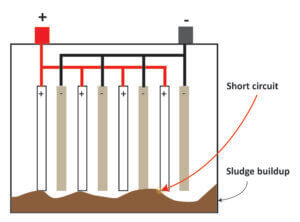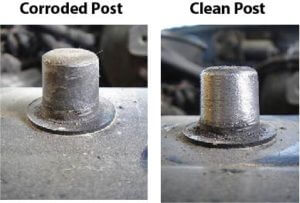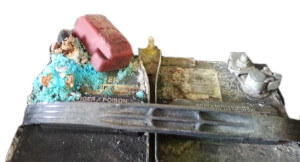What causes a car battery to die quickly?
What causes a car battery to die quickly?
I volunteer on a lot of auto forums and I often see people say, “My car battery worked just fine yesterday but is totally dead today. How come my car battery died quickly?” There can be many reasons; some that are out of your control and others that are completely your fault. Let’s go through them. But first a quick overview of how batteries die.
Lead-acid automotive batteries die from four causes:
Heat is the #1 killer of car batteries
High underhood temperatures along with high ambient temperatures increase chemical activity inside the battery. The high chemical activity causes internal corrosion resulting in high internal resistance. High resistance reduces the amount of power the battery can create and also reduces how much recharging power the battery can accept.
Car battery capacity fade kills car batteries
Over time all batteries lose the capacity to accept and store energy. The capacity fade is gradual and falls until one day the battery simply doesn’t have enough stored power to start your vehicle. In fact, once capacity fade falls to around 40% or less, you can experience battery failure. Capacity fade is even more pronounced in cold weather when chemical activity slows. So a battery with 50 capacity can easily start your car at 60°F, but fail to start it the next morning when temps drop to freezing.
Sulfation is a car battery killer
As a battery sits in a partial or total discharged state, sulfate crystals form on the plates. The longer the battery sits in a discharged state, the more the crystals grow. Large sulfate crystals prevent the electrolyte from entering the pore of the plates. Minor sulfation (small crystals) can be reversed with a reconditioning charge routine. But hard crystals can’t be reversed.
Acid stratification caused by constant charging or battery maintainers— Fully charged electrolyte is heavier than water. When a battery is left on a battery maintainer, the heavier electrolyte falls to the bottom of each cell, increasing the acid concentration at the bottom. That causes plate damage.
Your car battery died quickly because of what you did to it or how you drove your car
• Left your headlights, interior lights, emergency flashers or radio on when the engine wasn’t running. You basically drained the battery so far that it died.
• You left the blower motor running and the AC turned to the ON position when the engine wasn’t running. (See above).
• You let your car sit for long periods of time without running the engine. Car batteries self-discharge at the rate of 1-2% per day (more in warmer weather) with no draw on them. So your battery can be up to 60% discharged in a month. In addition, car computers always draw some current from the battery, so letting it sit without driving is really hard on the battery.
• You didn’t drive long enough to recharge your battery. Starting a cold engine requires a lot more power from the battery. If you drive a short distance and shut off the engine, the battery won’t recharge enough to replace the power needed to start.
• You neglected battery maintenance. Battery terminals must be kept clean.
Your car battery died because it was old
Car batteries simply don’t last as long as in the past and it’s not because of some grand conspiracy by car battery manufacturers. It’s just the opposite, car battery technology has gotten much better over the last 20 years. But carmakers have placed much higher demands on car electrical systems over the same time period. Did your 1963 Chevrolet Impala have heated seats, heated mirrors, daytime running lights, rear window defogger, power seats, power windows, AC, high powered stereo and a dozen computers? Nope. The batteries and alternators in those old cars had to power headlights and a blower motor. That’s it.
Car battery life in a late model vehicle is usually 3-4 years. That’s all they can handle. If your three-year-old car battery died, it just hit the end of its life cycle. Case closed. Replace it.
Ok, but what caused your car battery to die quickly?
This confounds a lot of people. Your car started without the slightest hint of low power. You drove it to several places and then, all of a sudden, all you hear is a single click or nothing! Why? Sudden battery failure dead like that is usually caused by an internal short circuit which is caused by battery plate shedding.
What is car battery plate shedding?
Flooded lead-acid batteries are made from individual plates that are formed in a grid pattern. The grid pattern is designed to allow for the maximum acid-to-plate contact area. Sulfation builds up on the negative plate material which acts as an

Short circuit caused by battery plate shedding
insulator. And, the lead material on the positive plate flakes off or “sheds” due to normal expansion and contraction during charging and discharging cycles. So the negative plate loses performance due to loss of surface area caused by sulfation buildup and the positive plate sheds, forming a brown mud-like sediment at the bottom of the battery case.
The battery plates sit above a built-in sediment trap at the bottom of the case. If the sediment level builds to the point where it touches a positive and negative plate, the battery shorts out. That’s precisely what happens when your car starts just fine and is suddenly dead.
Battery plate shedding is INEVITABLE. There is nothing you can do to prevent it.
What else causes a car battery to die quickly?
High heat, grid growth, plate buckling, and loss of water can also cause a battery to die. In fact, experts say that almost half of all premature car battery failures are caused by loss of water due to lack of maintenance, high under-hood heat conditions, or overcharging.
High heat car battery facts
Look at these stats from battery manufacturers:
• Johnson Controls reviewed dead batteries that were used in hot climates. Their analysis shows that the average battery life in hot climates is 37 months.
• Interstate Batteries own surveys show just a 30-month life in hot climates.
• That’s less than the 48-month average life shown in surveys by the Battery Council International (BCI)
If you live in the Southern U.S. short battery life is just, um, a fact of life.
Poor maintenance can kill your car battery
Battery terminal corrosion causes excessive resistance. When  electricity hits high resistance, it causes heat. Heat kills batteries. Get it? When your car’s voltage regulator sees high resistance at the battery, it increases the charging voltage and that creates more heat. So keeping your battery terminals and cables clean and in good condition is the best way to get maximum life out of your battery.
electricity hits high resistance, it causes heat. Heat kills batteries. Get it? When your car’s voltage regulator sees high resistance at the battery, it increases the charging voltage and that creates more heat. So keeping your battery terminals and cables clean and in good condition is the best way to get maximum life out of your battery.
Acid stratification kills batteries
Car battery electrolyte is a mix of sulfuric acid 30% and water 70%. When you drive your vehicle, the discharge and recharge cycle moves the electrolyte around. So does the vibrations from driving. But when you let your car battery sit for weeks on end, the acid stratifies, falling to the bottom of the battery where it starts degrading the plates. Want to extend the life of your lead-acid battery? DRIVE IT.
More car battery articles
Why is your car battery dead in the morning? See this post
Do you know how to clean your car battery terminals? See this post
Here’s how to test a car battery
Do you know how to replace a car battery in a late model car? It’s more complicated than in the past. See this post

These corroded battery terminals are killing this battery
©, 2019 Rick Muscoplat
Posted on by Rick Muscoplat